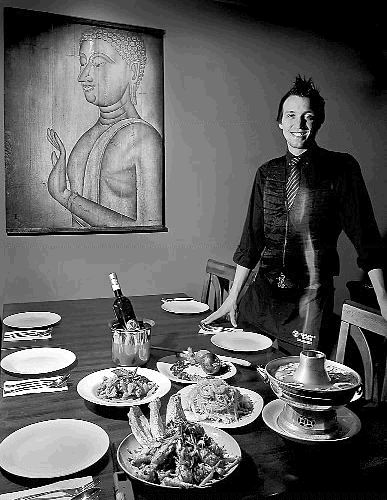Mia Stainsby
Sun

Nash Mawani, owner of Jambo Grill, with some of his favourites. Mawani is known for his friendly greetings. Photograph by: Steve Bosch, Vancouver Sun
JAMBO GRILL
3219 Kingsway, 604-433-5060. www.jambogrill.ca
– – –
There are scores of humble mom and pop restaurants around Metro Vancouver and the interesting ones don’t always declare themselves. Several readers pointed this one out when I made a call for your favourite global restaurant.
You liked the food at Jambo Grill and you also liked the friendly owner. Jambo means “hello” in Swahili, a tipoff that there’s some African influence here. The food is so Vancouver — a fusion of Indian, East African, a few gulps of Iranian flavours, as well as Indian-style homage to North American fries and pizza on lovely naan. Owner Nash Mawani has a selection of his own African/Indian creations, like deep-fried Cornish hen with Nairobi-style sauce, Masai ribs, jungle ribs.
He’s been running Jambo since 2005. On the sign outside, you’ll see Good Morning Paan. Bit of history to that. In 1939, a Ugandan immigrant opened a paan cafe, paan being an Indian street food or dessert — it’s a mix of lime paste, betel nuts, rose extract, tiny sweets, rose petals wrapped in betel leaves. The only words this man would say in English, no matter what, was “good morning” and so locals ignored the real name of this business and called it the Good Morning Paan place.
Mawani decided to buy the Good Morning Paan name and incorporate the dish into his menu when people kept coming for it. If you go to their website, they’ve posted a YouTube video of him making paan.
On the main menu, however, Gujarati Thali goes for $14.98 and comes with two curries, rice, naan, pappadam, dal and dessert. The Grill Combo, for $22.95, will easily feed two; it’s a big plate of rashni kebab (beef sausage), tandoor chicken, jungle ribs, and masala fries.
The menu features dishes such as bhajia (lentil patties), mogo (cassava fries), bateda wada (mashed potato balls in chick pea batter), paya (goat curry), halibut masala, and chicken or lamb biryani.
Mawani’s wife Yasmin does most of the cooking while he takes care of the front of house, visiting each and every table with warm welcomes.
© Copyright (c) The Vancouver Sun





